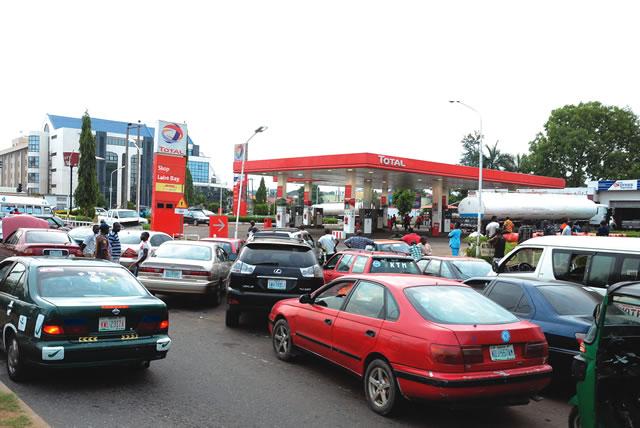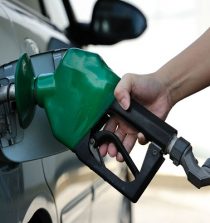Over time, petrol scarcity has become a tool to demand and implement increase in fuel price in the country. Would an enabling environment, capable of creating a free market in which demand and supply determine fuel pump price, resolve this issue, if the implementation of the Petroleum Industry Act (PIA) 2021 not been suspended? MUYIWA LUCAS takes a cursory look at the strategy.
For the second time this year, the country has been thrown into chaotic situations arising from scarcity of premium motor spirit (PMS). On each occasion, the effect was that the pump price of the commodity skyrocketed, though unofficially.
At the Nigerian National Petroleum Company (NNPC) retail outlets (filling stations) visited by The Nation, a litre of petrol sold at N175 as against the N160-N165 per litre benchmark. At other filling stations in Lagos and its environs, the commodity sold for between N180 and N190 per litre.
In Abuja and other states, marketers of the product increased the pump price, selling above the N165 a litre. This is in defiance to government’s directive on fuel pricing. Typical of such developments, the black market thrives as motorists continue to pay as much as N350 per litre to source fuel from the black market.
At some filling stations visited, including some NNPC franchisee stations across the state, the new price has been displayed on their pumps – an obvious indication to the public that they are not perpetrating any form of illegality with the increase. The unilateral increase by marketers at this period remains shocking to the public considering that government has not pronounced such price increase.
Even the regulator, the Nigerian Midstream Downstream Petroleum Regulatory Agency (NMDPRA), headed by Farouk Ahmed, feigned ignorance of such increase, insisting that prices were still the same.
The Executive Director, Distribution Systems, Storage and Retailing Infrastructure, NMDPRA, Mr. Ogbugo Kalu, at a briefing, said the Authority was ever ready to enforce the price on independent marketers who were planning to increase the pump price to N180 per litre.
“PMS is a regulated product. The price is fixed and the ex-depot price is known. The pump price remains at N165. So we continue to urge Nigerians to keep within these operating rules,” he said.

The President, Independent Petroleum Marketers Association of Nigeria (IPMAN), Chinedu Okoronkwo, blamed the high cost of logistics and the war in Ukraine for the development.
In his reaction to the sale of petrol above government-approved price at some private depots and independent marketers’ filling stations, the National Operations Controller, IPMAN, Mike Osatuyi, said that such development was expected because some depots would have incurred extra costs to procure the product in their depot.
“Why won’t the private depot sell beyond the official price? It is even God that knows how they get it (petrol) in the first place. So maybe they have incurred some extra cost in getting the product. It will shock you to know that some of my members don’t get the fuel supply for less than N180 per litre, so how much do you expect them to sell it? Anyway, if they able to fast-track the supplies, maybe by end of this month normalcy will return,” Osatuyi said.
Sustainability
The issue of price remains a major source of concern. With the naira hitting an all-time low against other international currencies, the cost of doing business has risen astronomically. This has affected the cost of running depots and other ancillary services associated in the value chain of petrol supply and distribution, including its storage.
For instance, the Depot and Petroleum Products Marketers’ Association of Nigeria (DAPPMAN) said it had become unsustainable to keep petrol at N165 per litre.
Sources close to independent marketers and their retail outlets blame the increase in pump price at their stations to the hike in ex-depot price at the private depot from where they get their supplies. It was gathered that most private depots recently raised the cost of petrol from the approved N142-N145 per litre to between N162-N170/litre. This, it is believed, accounted for why some filling stations owned by independent marketers sold fuel at N175-N190 per litre, as against the pump price of NN162-N165 per litre.
According to DAPPMAN, the costs of operating their fuel depots have gone up astronomically. It added that the petrol they supplied was sourced solely from Nigerian National Petroleum Company (NNPC) Limited’s marketing subsidiary, Petroleum Products Marketing Company Limited (PPMC), for sale to the public at the regulated price of N165 per litre. It said the purchase was made by depot operators with funds sourced with high bank interest charges, alongside increased costs of hiring vessels, with which they deliver fuel cargoes to their depots.
It also blamed the ongoing Russian/Ukraine War on the high cost of operating in the sector, explaining that the international prices of these items had risen astronomically and had more than doubled their old rates since the beginning of the war, thereby causing extreme increases in local prices.
“Depot Owners and the government have continued to struggle over time to sustain supply of PMS at the current pump price of N165 per litre despite the huge subsidy cost to government and abysmal margins to the Depot owners. Added to this is the scarcity of bunkers (ship’s fuel). We also experienced astronomical increases in the cost of diesel used to power equipment and machinery in our various depots and our retail outlets,” the statement said, adding that if not for the suspension of the implementation of the Petroleum Industry Act (PIA) 2021, an ideal enabling environment would have created a free market in which demand and supply would affect fuel pump price.

Claims Vs Reality
Typical of the NNPC at times like this, the firm during the week insisted that it has over two billion litres of PMS that would last for the next 34 days in the country, adding that there was enough stock to meet the nation’s demand. It also assured that in the next “three days, the Authority would focus its energy in making sure that the marine stock would be translated into inland stock to get petroleum products across the country”.
The Group Executive Director, NNPC, Adeyemi Adetunji, assured that NNPC was working with the entire operators and stakeholders in the downstream sector to ensure that petroleum products get to distribution channels and filling stations across the country. “With all the apparatuses put in place, we can assure that the fuel queues will disappear in the next few days. Nigerians will continue to enjoy the free flow of petroleum products,” he added.
The Managing Director, Petroleum Pipeline Marketing Company (PPMC), Isiaku Abdullahi, said there were about three vessels in the Apapa jetty waiting to offload more than 60 million metric tonnes, adding that in due course, the potential and imagined fuel crisis in Lagos would be over.
“Within a very short while, we will see the fuel queues pale out. So that is what our focus in the Authority and for the next few days we urge every operator and indeed even assure the public that whatever glitches and supply gaps that have been observed will disappear shortly,” he assured.
But what the NNPC, as the sole importer of petrol has not made public is the reason for the supply stoppage it embarked on leading to the scarcity. At the onset of the scarcity, marketers had blamed the NNPC for stopping supply of the product to them.
IPMAN’s Chairman, Lagos Satellite Depot, Mr. Akin Akinrinade, lamented the shortage of petrol in their depot, saying that since last December, not a litre of petrol had been lifted at the NNPC satellite depots at Ejigbo. The situation has put independent marketers at the mercy of private depots, whom he accused of hiking their ex-depot prices to a level no longer sustainable to sell fuel at N165 per litre.
Akinrinade said based on current economic realities, the sustainable pump price for petrol should be at N180 per litre.
NNPC’s silence on the issue has been deafening. Efforts to get the company to respond were futile as its spokesman, Garba Deen Muhammed, did not respond to enquiries.
Muhammed has always maintained deafening silence. He did not pick calls made to his mobile phone nor respond to text messages.
Source: The Nation










Your article helped me a lot, is there any more related content? Thanks!
A pharmacy I wholeheartedly recommend to others.
how can i get generic lisinopril no prescription
A trusted name in international pharmacy circles.
Their medication synchronization service is fantastic.
gabapentin 300 mg wikipedia
Their cross-border services are unmatched.
The children’s section is well-stocked with quality products.
where can i buy lisinopril online
Their free health check-ups are a wonderful initiative.
Their pharmacists are top-notch; highly trained and personable.
order lisinopril pill
They stock quality medications from all over the world.
They consistently exceed global healthcare expectations.
can i buy cipro
Their global approach ensures unparalleled care.